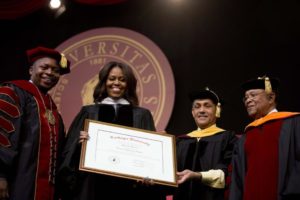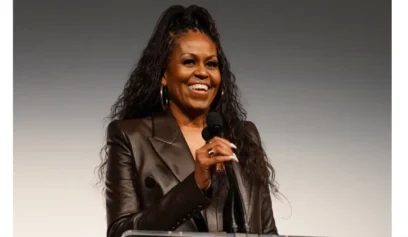
When Michelle Obama spoke to the graduating class at Tuskegee University, however, she took that last message one step further.
Her message to the audience at one of the nation’s most prominent HBCUs? Don’t let anything stop you—not even racism.
That encouragement comes at a particularly important time as America struggles with deteriorating race relations, and as the challenges of systemic racism are finally being pushed to the forefront of the national stage.
As these conversations become more prominent, the youth are becoming more educated than ever on issues such as mass incarceration, voter disenfranchisement, racially biased hiring practices, racially discriminatory lending practices and, of course, a tragically flawed justice system that has failed to put an end to the ongoing nightmare of police brutality.
Contrary to popular belief, power isn’t the only thing that comes with such knowledge. In a case such as this, Black youth have also found themselves feeling discouraged but the nation’s first Black First Lady urged Tuskegee’s graduating class to toss those feelings aside.
“Ignore all the noise,” she instructed her young audience.
Obama noted that being Black in America is still something that comes with a vast amount of challenges and obstacles.
“Here’s the thing,” she said. “The road ahead is not going to be easy. It never is, especially for folks like you and me.”
She may don the title of the First Lady now, but both before and after her husband became president, she still felt the “sting” of racism. She revealed that she always noticed when strangers would cross to the other side of the street if they were walking towards her, as if she posed a threat to their safety. She opened up about being closely watched every time she entered a small store. She was also candid about dealing with the harsh criticisms and judgment that are so frequently tossed at Black women in a so-called “post-racial” society, noting the media’s use of coded language to take racially charged jabs at her.
“Over the years, folks have used plenty of interesting words to describe me,” Obama said. “One said I exhibited a little bit of ‘uppityism.’ Cable news charmingly referred to me as ‘Obama’s baby mamma.’”
But her speech wasn’t necessarily about the reality that she, just like every other Black person in the audience, had to face racism and discrimination in her daily life. It was focused on the idea that she never let such negativity prevent her from reaching her full potential.
“All of the chatter, the name-calling, the doubting, all of it was just noise,” Obama said. “It did not define me, it didn’t change who I was, and most importantly, it couldn’t hold me back.”
She went on to remind the students that the feelings of frustration, sorrow and anger that may come with facing discrimination are understandable but are still no excuse to shrink themselves or give up on their futures.
“But graduates, today I want to be very clear that those feelings are not an excuse to just throw up our hands and give up, not an excuse to lose hope,” she continued. “We can take on these deep rooted problems and together, together we can overcome anything.”
She stood before them as a living example of that.
Throughout President Obama’s time in office, his wife has maintained approval ratings that soared and launched initiatives and programs that benefit everyone from children striving to be healthy, to the families of the men and women that serve in military.

She was a success story despite the racially biased scrutiny she constantly faced.
“As potentially the first African-American First Lady, I was also the focus of another set of questions and speculations; conversations sometimes rooted in the fears and misperceptions of others,” she said. “Was I too loud, or too angry, or too emasculating? Or was I too soft, too much of a mom, not enough of a career woman?”
She even noted the time she playfully fist-bumped her husband only for the media to refer to the gesture as a “terrorist first jab.”
“My husband and I know how frustrating that experience can be,” she said. “We’ve both felt the sting of those daily slights throughout our entire lives…And all of that is going to be a heavy burden to carry.”
But, in the end, she said what matters is being resilient and strong and refusing to give up even when faced with the bleakest of circumstances.
“To succumb to feelings of despair and anger only means that in the end, we lose,” she added.
Fingers crossed that the new Tuskegee graduates, as well as Black youth from all across the globe, will let empowering messages like the one from the First Lady ring in their minds and drown out the noise of racial discrimination.


